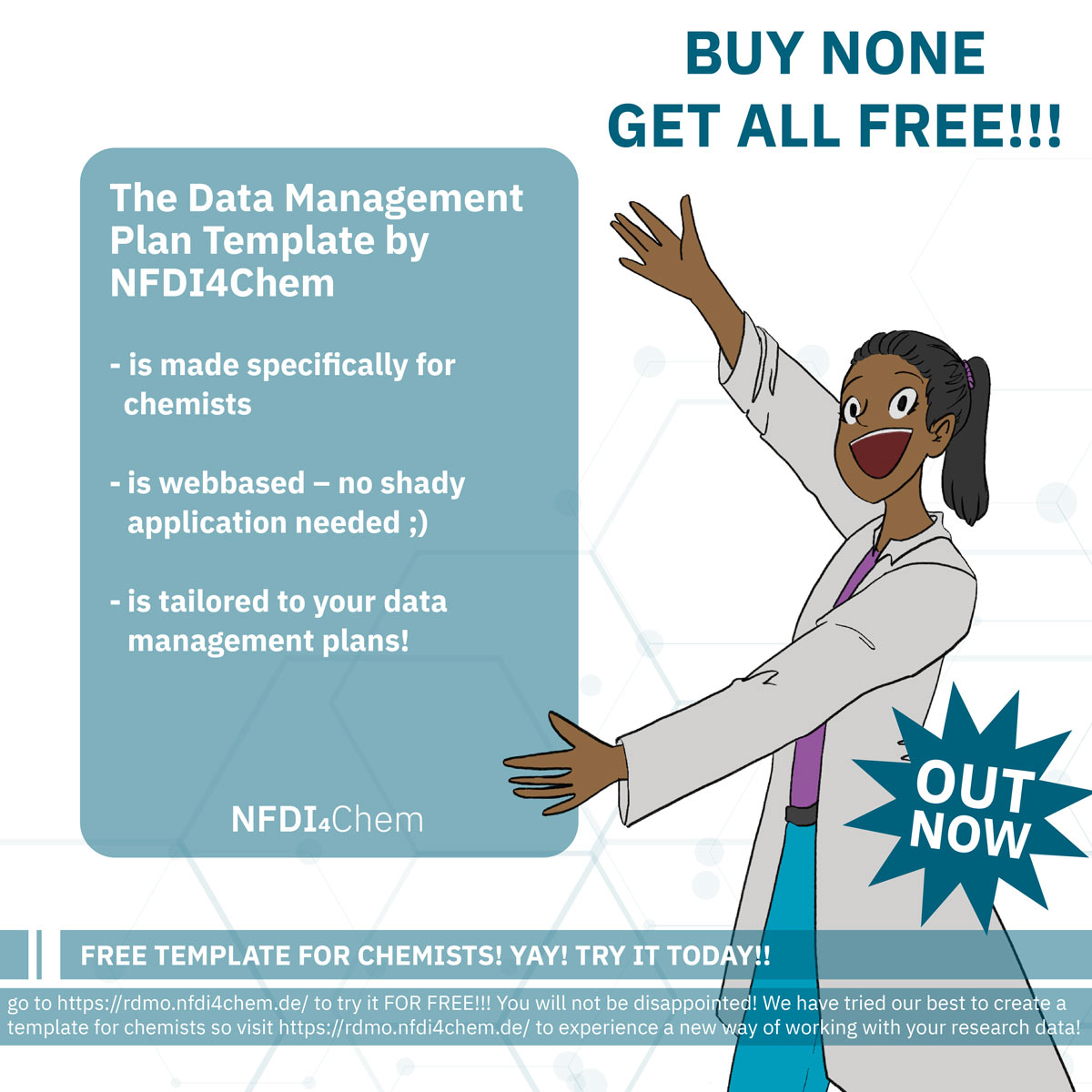NFDI4Chem provides chemistry-specific template
Data management plans support the planning, organization, long-term preservation and faster (re)retrieval of research data. A well-structured data management plan describes how data is collected, organized, secured, documented and finally made accessible. DMPs are also becoming increasingly important in chemistry, as data volumes are constantly increasing and the handling of data is becoming ever more complex.

NFDI4Chem has now created a free DMP template within the Research Data Management Organizer (RDMO) that can be used by everyone and has been optimized for the special requirements of chemists. It is based on the DFG checklist. The template is enriched with help texts and answer options and can thus also convey a feeling for what current standards and methods in chemistry are.
A specific template for chemistry
Chemical research has specific requirements that need to be considered in a data management plan. Chemistry data often includes experimental results ranging from spectra and reaction mechanisms to large amounts of data from simulations and calculations.
Our DMP template for chemistry offers solutions for all areas of chemistry:
- Consideration of chemistry-specific data types: our template includes questions and categories tailored to chemical data, such as spectroscopy data, structural information, reaction conditions and calculation results.
- Specific metadata requirements: Chemical datasets require specific metadata that includes information about, for example, chemicals used, laboratory conditions and precise measurement methods.
- Integration of standard formats and ontologies: Chemical research has specific data formats and ontologies that are not considered in a generic DMP template. Our template ensures that the correct formats and standards are used, which increases data exchange and reusability.
- Integration of physical samples: Our template not only refers to the data, but also addresses the management of physical samples. These are often part of the data, so it is important for us to establish this connection and map it in our template.
- Facilitating data exchange: Our template points to standardized formats and interfaces that facilitate the exchange of chemical data between different platforms and researchers. This not only improves the accessibility of data, but also its long-term usability.
Data management plans and tools such as RDMO are essential for the effective management of research data. With the DMP template, we are closing a gap and now offer tools for all aspects of the data lifecycle.
The importance of data management plans
A data management plan is a document that describes the strategies and practices for handling the data generated in a research project. These plans are not only a requirement of many funding organizations (e.g. DFG). They also offer practical advantages:
Long-term data protection: data management plans help to ensure that valuable research data is backed up and stored for the long term. They often include measures to safeguard against data loss due to technical errors, such as regular backups and storage in multiple locations.
Accessibility and traceability: A well-defined DMP determines how and where the data is stored and who has access to it.
Compliance with legal requirements and guidelines: Many institutions and funding organizations now require research data to be managed and stored according to certain standards.
Promote collaboration: A data management plan can clarify how data can be shared with other researchers.
About the Research Data Management Organizer (RDMO)
The Research Data Management Organizer (RDMO) is a tool designed to assist researchers in creating and managing their data management plans. It provides a platform where plans can be created, maintained and shared with others.
RDMO allows researchers to document changes to their DMP and save versions, as requirements and circumstances often change over the course of a research project. And because RDMO works as a web-based platform, the DMP can be viewed and edited by different project members, even external consultants or funders can be integrated.
In RDMO, you also have the option of using various templates. You can easily switch back and forth between the DFG checklist and the EU template, for example, without having to fill in questions that have already been answered again.
Links:
The chemistry template at RDMO https://rdmo.nfdi4chem.de/
The chemistry template as PDF https://doi.org/10.5281/zenodo.10948510
Data management plan in the knowledge base https://knowledgebase.nfdi4chem.de/knowledge_base/de/docs/dmp/
References
Hausen, D. A., & Andres, A.-C. (2024). Chemistry-specific Data Management Plan Template based on DFG checklist. Zenodo. https://doi.org/10.5281/zenodo.10948510
Hausen, D.A., Andres, A-C, Ortmeyer, J. and Herres-Pawlis, S. 2024. Road to a Chemistry- Specific Data Management Plan. Data Science Journal, 23: 21, pp. 1-10.
DOI: https://doi. org/10.5334/dsj-2024-021